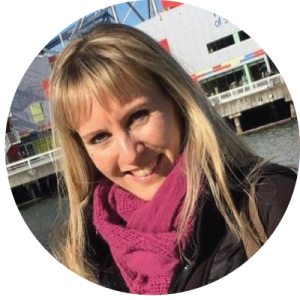By Alyson Hoy

Each year, February 1st feels like the start of the new year for me. That’s because in Canada, where I live, this date marks the beginning of Eating Disorders Awareness Week (EDAW). A national week of action focused on educating the public about eating disorders, February 1st through 7th is a time to spread awareness regarding the impact of eating disorders, address stereotypes and myths about them, and share information about the resources available for people living with or affected by eating disorders. For me personally, it is also a time to pause and reflect on how far I’ve come in the last year in my eating disorder recovery and to set my intention for the coming year as I move toward my goal of being as well as I can possibly be in both mind and body.
Something I know to be true about eating disorders, and that I’ve learned, particularly as I’ve faced my own challenges in recovery over the years, is that healing is not linear. Setbacks happen, and sometimes they do so unexpectedly. For example, we may be doing really well and making great progress for a period of time when, suddenly, we find ourselves slipping up or even approaching a relapse. This happened to me about five years ago, as I was starting to inch my way out of the deep, dark hole of anorexia. I was no longer restricting; I was on my way to being weight restored; I was letting go of behaviours, and I was beginning to experiment with intuitive eating. As I loosened my regimen and rules surrounding food, however, I began to slip back – almost without noticing – into a pattern of over-exercising. Inexplicably, I found myself, once again, at the gym most days of the week, pushing myself to unhealthy limits. Although a despairing time for me, this setback was critical because it taught me that relapses can and do happen and that when they do it doesn’t mean that we have failed. It also taught me that recovery is something we must continually work for and not take for granted. With these lessons in mind I resolved to intentionally carve out regular intervals of time for myself within which to renew my commitment to recovery and to set new goals going forward.
 This year, EDAW feels particularly significant, as it coincides with a major recent change in my life. At the close of 2018 I made the decision to leave my job after nearly ten years. For a long time, I was unhappy and unwell at work. Immersed in a toxic and unhealthy workplace environment, I suffered both physically and mentally. My anxiety reached unprecedented levels, and I was not sleeping or eating well. To make matters worse, I started to worry that all the hard work I’d done in my ED recovery was coming undone from the stress. I finally decided to resign after I was bullied by a senior manager and my employer was unwilling to address the behaviour and support me. Moving into 2019, then, I’ve been adjusting to a new quiet and calm in my life. I am no longer getting up at 5:00am and leaving my house by 6:15am. I am no longer hopping on a bus and then a sky train and a sky train and then a bus for a three hour commute every day. I am no longer feeling worn down and frazzled at the end of each day. Instead, I am back to doing the one thing I have always loved to do: I am writing again. As time passes, my anxiety is lessening and I can feel myself becoming more grounded.
This year, EDAW feels particularly significant, as it coincides with a major recent change in my life. At the close of 2018 I made the decision to leave my job after nearly ten years. For a long time, I was unhappy and unwell at work. Immersed in a toxic and unhealthy workplace environment, I suffered both physically and mentally. My anxiety reached unprecedented levels, and I was not sleeping or eating well. To make matters worse, I started to worry that all the hard work I’d done in my ED recovery was coming undone from the stress. I finally decided to resign after I was bullied by a senior manager and my employer was unwilling to address the behaviour and support me. Moving into 2019, then, I’ve been adjusting to a new quiet and calm in my life. I am no longer getting up at 5:00am and leaving my house by 6:15am. I am no longer hopping on a bus and then a sky train and a sky train and then a bus for a three hour commute every day. I am no longer feeling worn down and frazzled at the end of each day. Instead, I am back to doing the one thing I have always loved to do: I am writing again. As time passes, my anxiety is lessening and I can feel myself becoming more grounded.
Slowing down my pace of life and shifting my focus back to something I am passionate about isn’t without its challenges, however. Writing is a solitary endeavour, and, as such, one issue I am facing as I move on from my regular job is a lost sense of daily social connection. At work, for better or worse, I was surrounded by colleagues; there was always someone to talk to and social events were frequent. Working from home is a different story, as most days it is just me keeping company with my cat.
As many of us know, eating disorders thrive in isolation. Thus, one step I am taking to support my recovery in 2019 is taking the initiative (and stepping outside my comfort zone) to make new connections. A few weeks ago, I started taking an American Sign Language (ASL) class. As a kid, I loved learning sign language and with practice I even became somewhat fluent in it. Now, my circumstances are such that not only do I have the time, energy, and financial capability to pursue it again, but also, I have a strong curiosity and desire – particularly as someone who completed a PhD in Education – to engage in and reflect on the unique context and learning relations that ASL affords and fosters.
As I am finding out, an ASL class involves more than learning sign language and is actually quite useful in the way that it challenges and provides a means of working through the perfectionism and rigidity that typically characterize disordered eating behaviours. For example, because the class is taught by a Deaf person, and there are both Hard of Hearing and Deaf students in the class, the classroom is a designated “voice off” zone where we are not allowed to use our voices, but rather are encouraged to express ourselves and communicate in unfamiliar non-verbal ways, often through what feels like “silly” gestures. As new learners, our ability to communicate with one another such that we can facilitate a class at all, hinges on our willingness to take chances, to make mistakes, to risk being embarrassed or misunderstood, and to trust in one another. There is no room for perfectionism or hanging back in this context. If we want to be “heard” we have no other choice but to jump in and simply try! As a lifelong perfectionist, this kind of learning through risking the self definitely feels scary at times. Yet, with each passing week, I am gaining more confidence both in my ability to sign and in my willingness to trust myself and others, knowing that any mistakes we make will be met with grace (and usually with a lot of humour too!)
Another way that ASL class is helping me in my recovery is by forcing me to be present and fully in the moment. Contrary to common understanding, ASL is a complex language completely separate and distinct from English. To learn it requires careful concentration and attunement. It is not a matter of simply transposing English into hand signs, for ASL has its own rules for pronunciation, word order, and complex grammar. In a “voice off” classroom scenario students must pay careful attention to facial expression and body cues in order to know, for example, that raised eyebrows, widened eyes, and a forward-tilting body indicate a question is being asked. In addition, to not be able to hear someone’s voice while they are attempting to communicate something to you encourages you to be present with them in a different and, even, heightened and more intimate way: You learn the shape of their mouth and eyes; how emotions resonate for them; what their energy feels like. You learn a lot from someone when you share a space of silence. As I’ve been discovering, intrusive ED thoughts are just not possible when you are present with another person in this way.
Each year, Eating Disorders Awareness Week is an opportunity for the public to learn about the issues and challenges affecting millions of Canadians. This year, the theme “Eating Disorders Can’t Afford to Wait!” focuses attention on the limited resources available for support and creates an opportunity for dialogue and discussion regarding the need for further research and for providing better treatment options and enhanced training. Although an education and awareness campaign focused on the public, EDAW is actually a really great time for those of us who are struggling and in recovery to further our own learning as well. As I have discovered, learning about eating disorders does not stop simply because one is getting better or recovered. In order to truly be well from eating disorders we need to continue to educate and challenge ourselves, to learn and try new things, and to sometimes risk what feels comforting and familiar as a necessary step to break free from those deeply inscribed patterns of behaviour that just don’t serve us anymore.

Alyson holds a PhD in Curriculum and Instruction from the University of British Columbia, an M.A. in Women’s Studies from York University, and a B.A. (Hons.) in Women’s Studies from Western University. Working at the intersection of memoir writing and queer and feminist theories of feeling and embodiment, her scholarship weaves the poetic and the autobiographical to explore themes of intimacy, emergent queer identities, sex and sexuality, trauma, eating disorders, and self-harm. Her current project is a book manuscript of my doctoral dissertation on trauma and queer memoir. Her most recent publication is a chapter entitled “Haunted by Real Life: Art, Fashion, and the Hungering Body,” in Canadian Curriculum Studies: A Metissage of Inspiration / Imagination / Interconnection (Canadian Scholars, 2018). Beyond academia, I am a writer and advocate for eating disorders awareness and prevention. I write to explore the ways in which identity and illness are implicated in each other and to consider how art-making can be a means for healing.